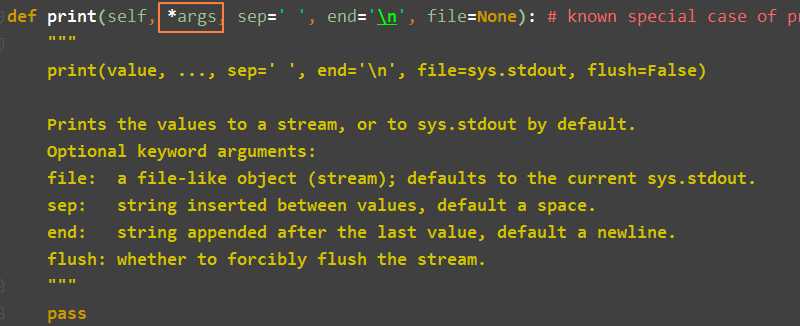标签:error str word syn bsp ems 没有 分享 自动
python中的*和**,能够让函数支持任意数量的参数,它们在函数定义和调用中,有着不同的目的
>>> def f(*args): print(args) >>> f() () >>> f(1) (1,) >>> f(1, 2, 3, 4) (1, 2, 3, 4) >>>
>>> def f(**kwargs): print(kwargs) >>> f() {} >>> f(a=1, b=2) {‘a‘: 1, ‘b‘: 2} >>>
>>> def func(a, b, c, d): print(a, b, c, d) >>> args = (1, 2, 3, 4) >>> func(*args) 1 2 3 4 >>> args = [1, 2, 3, 4] >>> func(*args) 1 2 3 4
>>> def func(a, b, c, d): print(a, b, c, d) >>> kwargs = {"a": 1, "b": 2, "c": 3, "d": 4} >>> func(**kwargs) 1 2 3 4
>>> def foo(*args, **kwargs): print(args) #未解包参数 print(*args) #解包参数 >>> v = (1, 2, 4) >>> d = {‘a‘:1, ‘b‘:12} >>> foo(v, d) ((1, 2, 4), {‘a‘: 1, ‘b‘: 12}) (1, 2, 4) {‘a‘: 1, ‘b‘: 12}
表面上看并没有什么函数,实际上是有的,用的就是format的函数调用
>>> c = {"name": ‘zhang‘, "age": 2}
>>> **c
SyntaxError: invalid syntax
>>>
>>> "Name:{name}, Age:{age}".format(**c)
‘Name:zhang, Age:2‘
参考源码中对format函数的定义

但是这个字典解包不能用print函数输出
>>> print(**c) Traceback (most recent call last): File "<pyshell#40>", line 1, in <module> print(**c) TypeError: ‘age‘ is an invalid keyword argument for this function >>>
因为上述字典解出来的形式是这样的:
**c = name=‘zhang‘,age=2
而print函数只支持*args,不支持**kwargs

@ddt.data(*all_caseDatas)中,data是一个函数,调用函数的时候,参数*all_caseDatas自动将参数列表[{}, {}, {}...]解包为{},{},{}...,在def data(*values)函数中,*会自动将各个位置参数打包成新的元组({}, {}, {}...),然后@ddt.data就可以获取每一条数据作为测试用例了
@ddt.data(*all_caseDatas) def test_my_request(self, case_data): global global_var if len(global_var) != 0 and case_data["request_data"] is not None: for key, value in global_var.items(): if case_data["request_data"].find(key) != -1: case_data["request_data"] = case_data["request_data"].replace(key, value)
请写出下列代码的运行结果
def f(str1, *args, **kwargs): print(str1, args, kwargs) l = [1, 2, 3] t = [4, 5, 6] d = {"a":7, "b":8, "c":9} f(1, 2) f(1, 2, 3, "python") f("python", a=1, b=2, c=3) print("================") f("python", l, d) f("python", *t) f("python", *l, **d) f("python", q="winning", **d) 运行结果: 1 (2,) {} 1 (2, 3, ‘python‘) {} python () {‘a‘: 1, ‘b‘: 2, ‘c‘: 3} ================ python ([1, 2, 3], {‘a‘: 7, ‘b‘: 8, ‘c‘: 9}) {} python (4, 5, 6) {} python (1, 2, 3) {‘a‘: 7, ‘b‘: 8, ‘c‘: 9} python () {‘a‘: 7, ‘b‘: 8, ‘q‘: ‘winning‘, ‘c‘: 9}
需要注意的是f("python", *t)是把列表t先解包成 4, 5, 6,然后在def f(str1, *args, **kwargs):中将4, 5, 6重新打包成新的元组(4, 5, 6)再传递给变量args
标签:error str word syn bsp ems 没有 分享 自动
原文地址:https://www.cnblogs.com/cnhkzyy/p/9410658.html